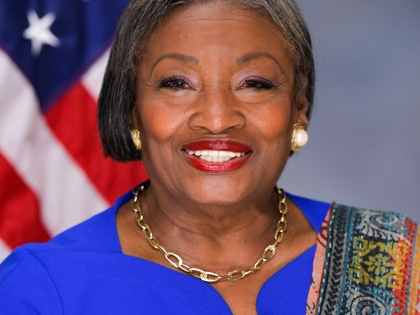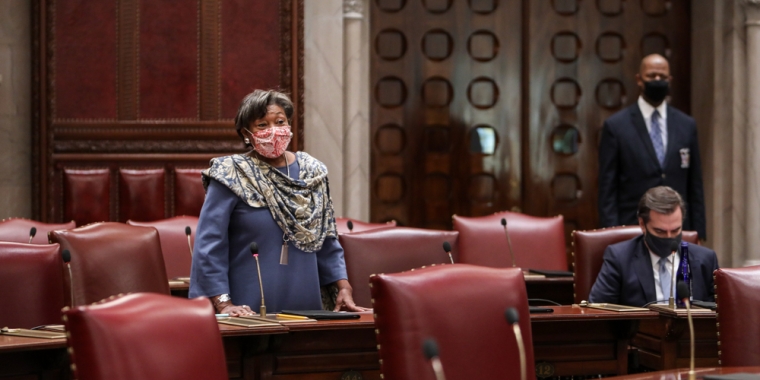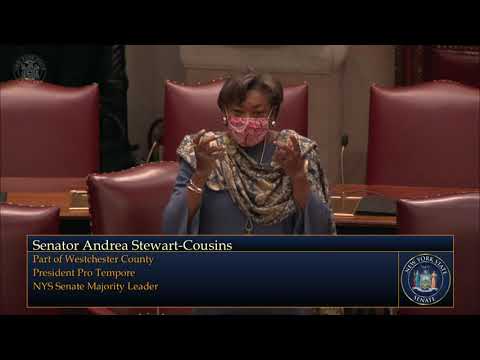
Press Release: Senate Democratic Conference Release Minimum Wage Report And Push For Local Minimum Wage Option
Andrea Stewart-Cousins
June 2, 2014
-
ISSUE:
- Labor
- Minimum Wage

Albany, NY - The Senate Democratic Conference today released a comprehensive report detailing the economic benefits New York State would receive from authorizing a minimum wage local option. The Senate Democratic Conference also urged for immediate passage of legislation that would allow local governments to raise the minimum wage within their municipalities.
“Minimum wage earning New Yorkers, despite their hard work and often having more than one job, continue to struggle to make ends meet,” Democratic Conference Leader Andrea Stewart-Cousins said. “The Senate Majority’s failure to adequately raise the state’s minimum wage has hampered economic growth and severely limited the purchasing power of millions of families throughout our state. Local governments should be provided the authority to address the needs of their constituents, and I urge the Senate Republican/IDC Coalition to pass this common sense legislation immediately.”
Senate Democratic Conference Deputy Leader Michael Gianaris said, “New York should be a national leader in setting a fair wage for our most vulnerable neighbors. Instead, we unacceptably lag behind other states and localities that provide fairer compensation for their workers. If the Senate Republican coalition cannot do better than providing half-loaf solutions, our local governments should be empowered to do it right.”
The Senate Democratic Conference recognizes that local governments are better suited to address the minimum wage requirements of their constituents. Senate bill S.6516, introduced by Senate Democratic Conference Leader Andrea Stewart-Cousins, will enable local municipalities within the State of New York to raise the minimum wage within their jurisdictions. This legislation would allow local governments with higher costs of living to address wages within their localities without waiting for state action.
The report released by the Senate Democratic Conference demonstrated that raising the state’s minimum wage will help stimulate economic activity and grow local economies in communities and regions throughout New York. The report included information provided by economic experts and minimum wage activists to conclusively illustrate that raising the minimum wage will strengthen New York’s economy.
Ranking Member of the Senate Labor Committee, Senator José Peralta said, “Enabling local governments to better serve their constituents and address the costs of living within their communities is a common sense way to help all New Yorkers earn a living wage. I hope the Majority Coalition will listen to the voices of millions of New Yorkers demanding a living wage and will bring these good bills before the Senate Labor Committee, and to the Senate floor for a vote.”
Senator Gustavo Rivera said, “New Yorkers are being kept in a cycle of poverty because our state’s current minimum wage does not come close to covering the cost of living, for an individual, much less a family. New Yorkers deserved to be paid a livable wage that allows them to build a better future for themselves and their families. It is time to pass legislation to allow our cities and counties to be able to raise their minimum wage so that it is proportional to the cost of living of its residents.”
Senator James Sanders Jr. said, “The rich are getting richer and the poor can’t feed their families. No one who works a forty-hour week should live in poverty. In addition, in a state as large and diverse as New York, we must realize that the wage required to live in New York City may be different from the wage needed in Buffalo or in Watertown. The state minimum wage should be established at a level above the poverty line and local jurisdictions should be able to raise it above that if they deem it necessary to keep their citizens out of poverty.”
Senator Daniel Squadron said, “Workers should earn a fair day’s pay for a fair day’s work. But the truth is, for millions of New Yorkers, hard work is met with poverty wages,” said Senator Daniel Squadron. “That’s why we must take an all-of-the-above approach when it comes to raising wages for workers who need it most. That includes raising the minimum wage, giving localities the ability to set wage standards above the state and federal minimums, and requiring chain retailers to pay their workers a living wage.”
Valerie Ervin, Executive Director of the Center for Working Families and a Former Montgomery County, Maryland Council Member, said, “Maryland officials found that giving cities and counties the power to raise the minimum wage helped us address local needs and set a wage that reflects the cost of living of that particular city or country.”
Tsedeye Gebreselassie, Staff Attorney for the National Employment Law Enforcement Project, said, “Yet another study has pointed out what New Yorkers already know: It is important to support raising wages because we have the highest level of income inequality in the country. This is why localities across the state should be allowed to set own minimum wage rate.”
Erik Rettig, Northeast Outreach Manager for Small Business Majority (SBM), said, “Letting city and county authorities set and increase their local minimum wages to reflect the cost of living in their area will give New Yorkers more money to spend at small businesses. This will help create jobs and grow the economy.”
The legislation and report advanced by the Senate Democrats build on the conference’s long-time support and advocacy for raising the minimum wage. Enabling local governments to raise the minimum wage within their municipalities is a common sense way to address the issues concerning different costs of living in communities throughout New York State.
Senator Martin Malavé Dilan said, “The current minimum wage is out of step with the everyday financial realities of working New Yorkers. The widening gap has left an entire generation struggling to make ends meet, all the while caring for the younger generation doomed to the same cycle. A real wage, indexed, with the flexibility for localities to adjust wages in accordance with local markets, is the only real light at the end of the tunnel for New York’s working families.
Senator Brad Hoylman said, “A dollar in New York City just doesn’t go as far as it does in other parts of the state. For example, New York City’s cost of living is 83% more than Buffalo, 91% more than Syracuse, and 92% more than Binghamton. Full-time low wage workers are still left unable to provide for their families and are often times forced to choose between basic necessities like food and rent. It’s time to allow cities like New York to account for these regional differences by allowing them to have direct control over their minimum wages and equitably provide for their low wage workers.”
Senator Tim Kennedy said, “This is a country and a state where we’ve always said, if you work hard and play by the rules, you can achieve the American Dream. With so many families struggling with low and stagnant wages, we must continue our fight for fair wages and good-paying jobs. A growing number of New Yorkers are working low-wage jobs these days – students working minimum-wage jobs to cover tuition costs, senior citizens trying to supplement depleted retirement savings, single parents relying on low-wage employment to care for children. Now more than ever, we need to ramp up our efforts to ensure working families have the opportunity to earn wages that will help them cover the constantly rising costs of raising a family.”
Senator Liz Krueger said, “These proposals make good economic sense at the same time as they advance the cause of social justice. New York is a large, diverse state with major cost-of-living differences between regions. Our minimum wage is increasingly lagging behind other states, and it should be higher across the board -- but at the same time, our more expensive cities should be allowed to act to guarantee workers a wage they can live on. This is only one of a huge range of issues where Albany politicians and bureaucrats must stop tying local governments’ hands.”
Share this Article or Press Release
Newsroom
Go to NewsroomSenate Majority Helps Small Businesses Build Back From COVID-19
January 19, 2021


Honoring Rev. Dr. Martin Luther King Jr.
January 18, 2021